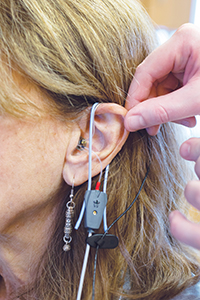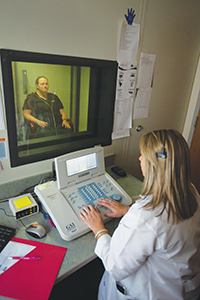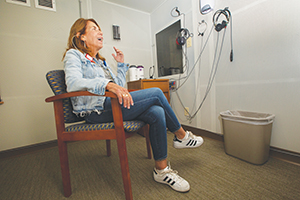By KEN LEISER
Americans suffering from mild to moderate hearing loss soon will be able to buy more affordable hearing aids over the counter once the devices meet federal safety, labeling and manufacturing standards under development now.

Kathleen Garavalia has her hearing aid programming validated at the audiology center at Mercy Hospital St. Louis.
Karen Elshout/ © CHA
The Food and Drug Administration Reauthorization Act of 2017 directs the FDA to make hearing aids available without a prescription or a visit to a physician or audiologist. Proposed regulations governing the devices must be issued by August 2020 and the public will have an opportunity to comment, said Alison Hunt, an FDA press officer.
By law, the agency must finalize the rules within 180 days after the close of the comment period. The FDA is committed to "ensuring the proper guardrails are in place to make over-the-counter hearing aids a safe and effective option for consumers," Hunt said.

Main
While the availability of over-the-counter, self-fitted hearing aids has been cast as a major breakthrough for consumers who can't afford to spend thousands of dollars for traditional hearing aids, some clinicians are wary that people will sidestep audiologists altogether and treatable medical conditions will go undiagnosed.
"We really are glad that there's more awareness of the importance of addressing hearing loss," said Jennifer Main, a clinical audiologist with Mercy Audiology in St. Louis. "We just think that taking the professional out of the picture in order to drive down cost is not the optimal solution to this problem."
Big ticket purchase
Dr. Frank Lin, director of the Cochlear Center for Hearing and Public Health and a professor at the Johns Hopkins University School of Medicine and Bloomberg School of Public Health, said that with an average price tag of $4,700, a set of hearing aids can reflect the third-largest purchase in a typical American's life behind a house and a car.

Lin
According to the FDA, about 37.5 million Americans aged 18 and older report mild to profound hearing loss. Hearing loss can result from aging, exposure to loud noises or certain medical conditions.
Most insurance companies do not cover the cost of hearing aids or their fitting, nor does traditional Medicare. Age-related hearing loss usually affects both ears, meaning most sufferers would benefit from having two devices at roughly $2,350 apiece.
Out-of-pocket cost is not the only impediment to correcting hearing loss. The President's Council of Advisors on Science and Technology reported in October 2015 that in European countries, where people with hearing loss can obtain free or low-cost hearing aids, many don't use them because of the social stigma or the association of the devices with old age.
But that decision may carry risks.
Loneliness, depression and fall risk
During a presentation at the Bloomberg School of Public Health in May, Lin cited research that shows people suffering from hearing loss are at higher risk of dementia, depression and hospitalization. Other potential consequences can include social isolation, injury from falls, and inability to work, travel or be physically active.

Kristy Greco, a clinical audiologist at Mercy Hospital St. Louis, conducts a hearing test on Ashley Weilbacher, at the Mercy Audiology and Hearing Aid Center on the hospital's campus in suburban St. Louis. Weilbacher works at the hospital.
Karen Elshout/ © CHA
Lin testified in support of the Over-the-Counter Hearing Aid Act before the House Committee on Energy and Commerce's health subcommittee in May 2017. During his testimony, he told lawmakers that only 20 percent of Americans suffering from significant hearing loss actually use hearing aids.
Dr. William Luxford, an ear, nose and throat specialist on staff at Providence Saint Joseph Medical Center in Burbank, Calif., said there are apps that allow consumers to administer their own hearing tests, which can provide reasonably accurate results.
While the over-the-counter hearing aids have not yet been developed, they are on their way and "it's not something that either physicians or audiologists are going to prevent." Clinicians should be prepared to work with the consumers, he said.
"I think it's going to be there and we have to learn to work with it because that's the best way to provide the patient with the best care," he said. "You really want to approach this as what is best for the patient."
First in class
In October 2018, the FDA gave the audio company Bose the go-ahead to market the first self-fitting hearing aid for people age 18 and over with mild to moderate hearing loss. The product is not yet available. Market watchers expect it to be comparable to Bose Hearphones, a sound-amplifying device not categorized as a medical device. Hearphones include noise-reduction technology and retail for about $500.

Kathleen Garavalia has her hearing tested at the Mercy Audiology and Hearing Aid Center.
Karen Elshout/ © CHA
Although consumers will be able to fit, program and control the Bose hearing aid without assistance from a health care provider, the FDA said Bose "must comply with applicable state laws that might require hearing aids to be purchased from or dispensed by a licensed hearing aid dispenser."
In approving the Bose hearing aid, the FDA referenced clinical studies of 125 patients that demonstrated that consumers preferred the hearing settings they selected over those set by professionals. The Bose device label must inform the consumer when to consult a hearing professional.
Perils of self-diagnosis
Main said that defining mild or moderate hearing loss is one of the shortcomings of the 2017 law authorizing the FDA to create the new category of over-the-counter hearing aids because "people are not very good at self-identifying if they have a hearing loss and how much hearing loss they have."
According to the Hearing Health Foundation, people with mild hearing loss may have difficulty hearing soft-spoken people and children. People with moderate hearing loss have more difficulty understanding speech. Without the use of hearing aids, someone with moderate hearing loss may not be able to follow a conversation or hear a phone ring, for instance.
In a traditional hearing evaluation, an audiogram — or a graph showing someone's hearing pitch by pitch — can reveal a mild hearing loss indicated by thresholds of the softest sounds the person can hear at each pitch in the range of 30 to 40 decibels, Main said.
The Hearing Health Foundation defines moderate hearing loss as difficulty hearing sounds in the 41 to 55 decibel range.
The test is run first by air conduction to see how the sound transfers through the entire auditory system starting at the ear canal. Audiologists also look at the measures by bone conduction, bypassing the outer and inner ear and directly stimulating the cochlea. A standard set of audiology tests also includes speech testing and middle ear assessment.
When patients try to self-diagnose their condition, they may miss types of hearing losses that can be improved by medical intervention — perhaps as simple as removing a ball of earwax or as complicated as repairing a hole in the eardrum.
Catherine Palmer is president-elect of the American Academy of Audiology and an associate professor at the University of Pittsburgh. She said about 10 percent of adults with hearing loss have a medical problem, and an audiologist would be able to guide them to the appropriate medical care.
Main added, "When you obtain devices directly without the hearing health care professional involved, there's also the concern that you're missing out on some important counseling and support in the interim."
Counseling can include discussions of the functional limitations of the patient's hearing loss and the opportunities to supplement amplification with other devices or communication strategies that can optimize the use of a hearing aid.
Despite their reservations, audiologists who spoke to Catholic Health World joined Main in expressing appreciation for the heightened awareness that the over-the-counter hearing aid law is bringing to hearing loss and its implications for patients' quality of life and health.